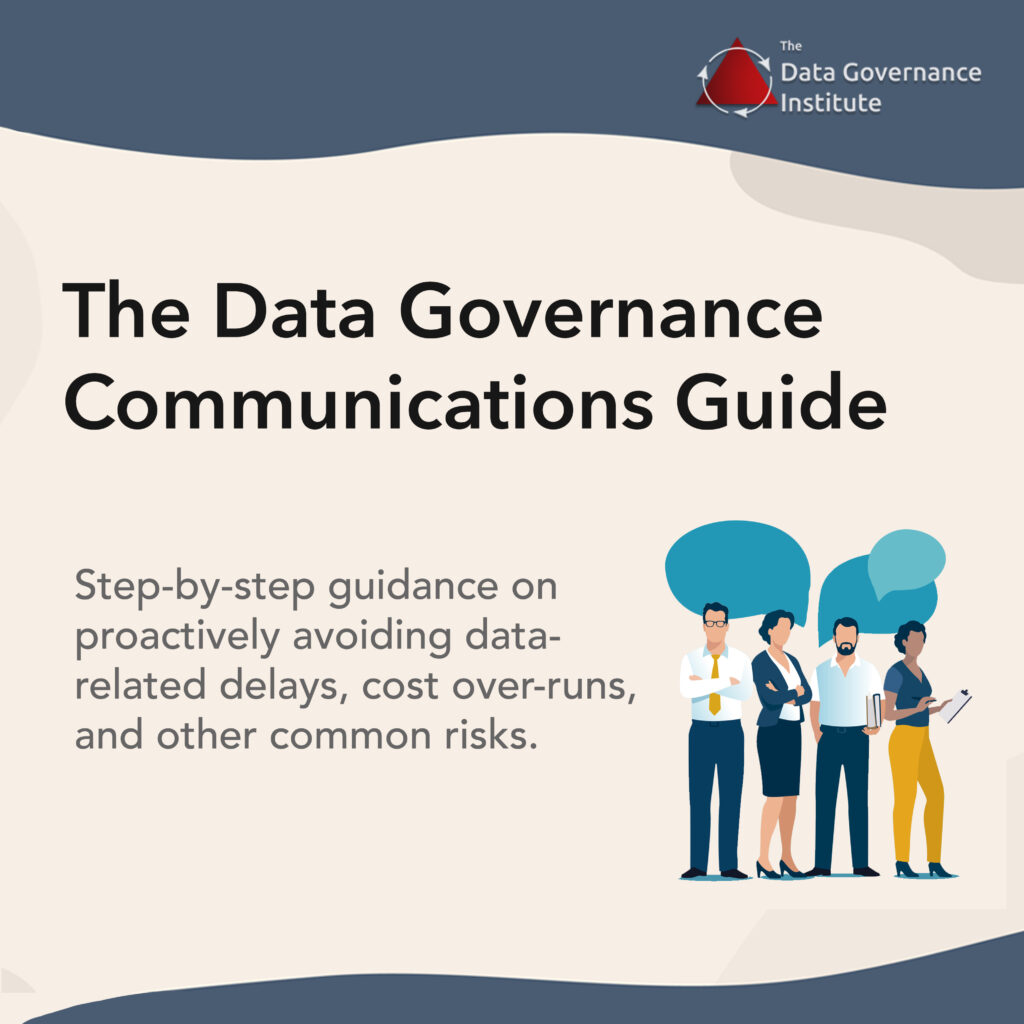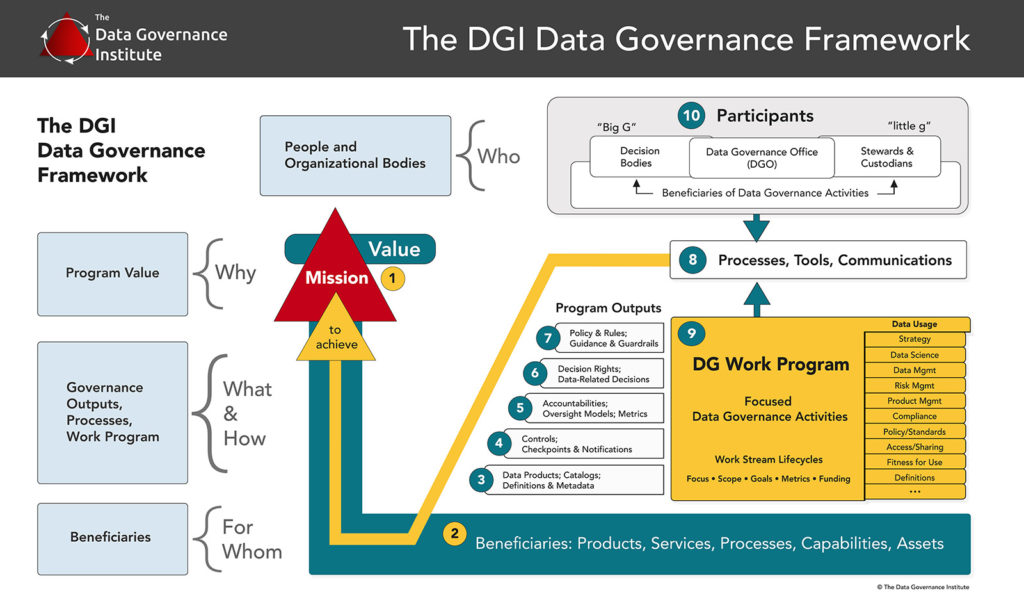What do you want Data Governance to accomplish?
Regardless of the focus of your program, chances are you hope to accomplish the following universal goals for Data Governance programs:

- Goal – Enable better decision-making
- Goal – Reduce operational friction
- Goal – Protect the needs of data stakeholders
- Goal – Train management and staff to adopt common approaches to data issues
- Goal – Build standard, repeatable processes
- Goal – Reduce costs and increase effectiveness through coordination of efforts
- Goal – Ensure transparency of processes
What else are you trying to accomplish? The most common objective of Data Governance programs is to standardize data definitions across an enterprise or initiative. Other goals and objectives depend on the focus of a particular Data Governance program.
Visit the Governance Focus Areas part of the site to read about the six most common “flavors” of Data Governance programs.
Also, regardless of your organization’s focus and goals, chances are you’re operating according to a set of universal governance principles. It’s a good idea for Data Stakeholders to discuss these with each other, so that everyone involved can be in alignment about the reasons behind governance practices.
You should establish the principles that make sense in your environment. Some organizations define principles that focus on helping participants survive the politics involved in Data Governance. Others focus on establishing data ownership or ensuring that accountabilities are apportioned between members of a Data Governance Office, Data Stakeholders, and those with Data Stewardship responsibilities. Still others focus more on ensuring that data becomes standardized, or of good quality. And some Data Governance principles focus on the way participants work with data as they perform processes such as issue resolution or change management.
Data Governance principles help stakeholders come together to resolve the types of data-related conflicts that are inherent in every organization.
Here are Data Governance Guiding Principles from the Data Governance Institute, along with comments.
1. Principle – Integrity
Data Governance participants will practice integrity with their dealings with each other; they will be truthful and forthcoming when discussing drivers, constraints, options, and impacts for data-related decisions.
This is essential. Your program is doomed to troubles unless your DGO staff act as “trusted brokers” of information when carrying messages between different stakeholders and participants.
2. Principle – Transparency
Data Governance and Stewardship processes will exhibit transparency; it should be clear to all participants and auditors how and when data-related decisions and controls were introduced into the processes.
Not everything can be transparent, of course. To be effective, sometimes security measures cannot be obvious. But for any data-related activity, the RIGHT people should be able to discover what’s going on.
3. Principle – Auditability
Data-related decisions, processes, and controls subject to Data Governace will be auditable; they will be accompanied by documentation to support compliance-based and operational auditing requirements.
If the focus of your program is something other that compliance, it’s easy to forget that others may need to review your work and your decisions.This principle requires balance; you need to leave trails when appropriate, but you don’t want to burn hours creating documentation that no one needs.
4. Principle – Accountability
Data Governance will define accountabilities for cross-functional data-related decisions, processes, and controls.
Often, Data Governance can provide a great service by addressing “gaps and overlaps” in data-related accountabilities. Look for situations where either NO ONE is accountable or SO MANY groups are listed as accountable that it’s likely that no one really is.
5. Principle – Stewardship
Data Governance will define accountabilities for stewardship activities that are the responsibilities of individual contributors, as well as accountabilities for groups of Data Stewards.
Don’t overlook situations where someone has not received the formal designation of Data Steward. They may still have stewardship responsibilities that should be baked into their formal accountabilities.
6. Principle – Checks-and-Balances
Data Governance will define accountabilities in a manner that introduces checks-and-balances between business and technology teams as well as between those who create/collect information, those who manage it, those who use it, and those who introduce standards and compliance requirements.
Establishing appropriate checks-and-balances that can guide management efforts is probably the single most important role of Data Governance.
7. Principle – Standardization
Data Governance will introduce and support standardization of enterprise data.
Not everything can be standardized – nor should it be. But achieving data standardization is a prerequisite for many high-value Business and IT projects. And it NEVER is achieved in a sustainable fashion without Data Governance and Stewardship
8. Principle – Change Management
Data Governance will support proactive and reactive Change Management activities for reference data values and the structure/use of master data and metadata.
If you want sustainable success for projects that involve data, then you need to control how that data changes. Yes, some data is supposed to change frequently. Other data – such as a list of valid values for the “State or Province” field in an address – should change rarely, and only with great deliberation and impact analysis. Most Data Governance programs become involved in data-related change management activities, if only by baking change notification activities into Data Stewardship accountabilities.
These principles are imbued in all successful Data Governance and Stewardship programs, processes, and projects. They are the principles that help stakeholders come together to resolve the types of data-related conflicts that are inherent in every organization.



